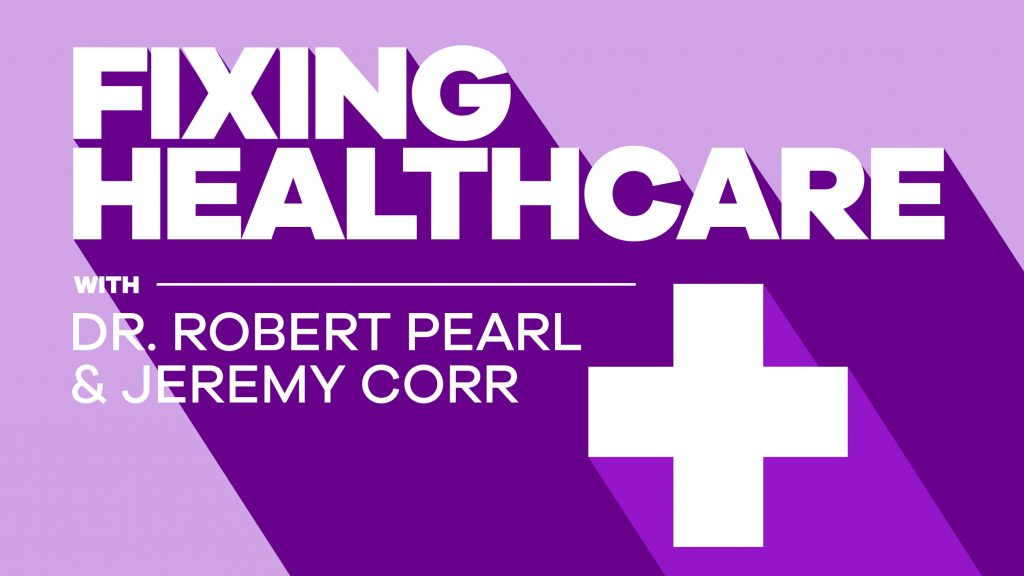At the end of Episode 19, Fixing Healthcare co-hosts Dr. Robert Pearl and Jeremy Corr turned to listeners for feedback one last time this season.
In this episode, listeners Jessica Haig Jones, Stacie Lampkin and Murali Talluri shared their personal—and sometimes painful—stories as patients. These powerful experiences fueled their recommendations for improving the role of government in healthcare.
This regular feature of season three came by way of the Fixing Healthcare Survey. Stay tuned for the final results of our latest survey and for ways to share your feedback during season for, which kicks off in April 2020.
Transcript from Fixing Healthcare (Episode 19)
Jeremy Corr: Before we go, let’s take a few minutes to hear some of the many suggestions we’ve received from our listeners who weighed in on the question: “How can the US government best improve healthcare?”
Each of the listeners wrote about their own medical problems and experiences. We heard from Jessica Haig Jones who has been receiving expensive epilepsy treatments for more than 20 years. She said she would not be here if not for her doctor who treated, quote, the patient and not the illness. Jessica urged the government and insurance companies to reimburse doctors appropriately for the time it takes to care for patients as individuals.
Stacie Lampkin told us that she would have gone bankrupt from her cancer treatments had she purchased a high-deductible health insurance plan through her employer. She hoped that the government would ban these low-premium plans that don’t adequately cover worst-case medical problems.
Finally, we heard from a physician, Murali Talluri, who was hospitalized in 2015 for a cardiac procedure in the same facility where she had worked for 20 years. Following the procedure, she needed assistance to go to the bathroom and had to ring for two hours for help. When the nurse came, she said she was too busy documenting to assist. She concluded that this is the only healthcare system in the world that is run by accountants and attorneys. She urged the government to return control to physicians and patients. Robbie, what are your thoughts on these suggestions?
Robert Pearl: Patients are becoming increasingly unhappy with the American healthcare system. Like Jessica, I recognize that the best medical care takes time, particularly for patients with chronic and complex medical problems. As a nation, we overpay for interventional procedures and underpay for spending time delving deep into the medical issues people have and the impact it has on their lives. The government can play a role by altering how it reimburses doctors who care for patients covered under Medicare, but its efforts will be opposed by various physician specialty societies.
Like Stacie, I believe that these low-priced, reduced-benefit options work great until you become sick. Then the out-of-pocket expenses and drug co-payments can drive you into bankruptcy. That is why I believe we need to, as a nation, implement approaches to not only improve quality, but lower cost. And that will demand that we change how healthcare is structured, reimbursed, technologically enabled and led.
Finally, I sympathize with Dr. Talluri. Having been hospitalized after I fractured my leg in an accident three years ago, I too needed help getting to the bathroom. Feeling helpless is a terrible sensation. I concur that the current healthcare system meets the needs of just about everyone, from drug companies to hospitals to insurance companies, besides the patient. And changing that will require governmental legislation.
Jeremy Corr: Once again, thanks to Jessica Haig Jones, Stacie Lampkin, Murali Talluri and everyone who has participated in the Fixing Healthcare survey on robertpearlmd.com. Next month we’ll begin season four. In it, we’ll bring in guests with big names and big ideas. We hope you’ll join us.
* * *
READ: Full transcript for Episode 19 with David Shulkin
Fixing Healthcare is a co-production of Dr. Robert Pearl and Jeremy Corr. Subscribe to the show via Apple Podcasts or wherever you find podcasts. Join the conversation or suggest a guest by following the show on Twitter and LinkedIn.

